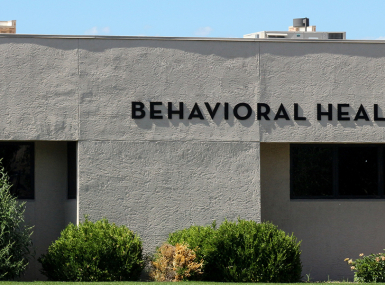Mental Health Awareness Month: County Participation Toolkit

Upcoming Events
Related News
This May, the National Association of Counties (NACo) invites the nation's 3,069 counties, parishes, and boroughs to participate in Mental Health Awareness Month. By showcasing how county governments provide vital behavioral health services and resources and by advocating for key mental health reforms—including repealing harmful exclusionary Medicaid policies, bolstering local crisis response infrastructure, supporting the behavioral health workforce, and ensuring mental health parity—we can effect significant change.
Intro
America's counties are frontline providers of mental health programs and services, acting as the nation's safety net for residents in need, first responders, and operators of essential facilities like crisis lines, public hospitals and detention centers. Due to their extensive interactions with residents seeking care, counties are pivotal in local, state and national efforts to fortify the mental health system.
Facing a nationwide crisis, an intergovernmental solution is imperative. Counties stand prepared to collaborate across public, private, and non-profit sectors to address this growing crisis through targeted federal policies, cross-sector partnerships and the enforcement of mental health parity.
This May, the National Association of Counties (NACo) invites the nation's 3,069 counties, parishes and boroughs to participate in Mental Health Awareness Month. By showcasing how county governments provide vital behavioral health services and resources and by advocating for key mental health reforms—including repealing harmful exclusionary Medicaid policies, bolstering local crisis response infrastructure, supporting the behavioral health workforce and ensuring mental health parity—we can effect significant change.
To demonstrate support, counties can utilize this template to pass a resolution declaring May as Mental Health Awareness Month in their jurisdiction.
Key Themes
This May, we will focus on innovation and policy advancement in mental health, equipping counties with the tools to drive federal advocacy and implement transformative solutions. This toolkit includes sample letters, op-eds, talking points, and social media posts to support engagement.
Weeks 1 & 2: Innovation – Transforming Local Systems for Better Access and Care
The first half of the month will highlight local innovations that are reshaping access to mental health services. Examples include:
- Exploring how counties are expanding care through new service models, leveraging technology and building community-driven solutions
- Examining efforts to strengthen the behavioral health workforce, including innovative recruitment, training and retention programs that ensure long-term sustainability
- Spotlighting how local governments are leading the way in achieving true mental health parity, ensuring that individuals receive timely and appropriate care without systemic barriers
Weeks 3 & 4: Policy Advancement – Strengthening Federal and State Partnerships
In the second half of the month, we will shift focus to policy advocacy that drives systemic change. This includes:
- Emphasizing the role of Medicaid in improving availability and access to community-based care by reforming exclusionary policies and expanding eligibility for critical services.
- Push for stronger federal partnerships to improve service coordination across behavioral health, housing and justice systems.
- Advocate for direct and flexible federal investments in local mental health infrastructure, ensuring counties have the resources needed to strengthen crisis response, workforce pipelines and integrated care models.
NACo Commission on Mental Health and Wellbeing
To recognize Mental Health Awareness Month, members of NACo's Commission on Mental Health and Wellbeing share their stories and perspectives on our nation's ongoing mental health crisis, highlighting the critical work of counties in addressing mental health in our communities.
Write Your Member of Congress
Use this template to ask your congressional delegation to pass bipartisan behavioral health policies that enhances the ability of localities to provide comprehensive mental health and substance use disorder services in all settings, strengthens the behavioral health workforce, bolsters crisis response systems and increases resident access to services. Download NACo's letter template and send a letter to Congress written on county letterhead, either through the U.S. Postal Service or via email. Information on office locations and contact numbers can be found on members’ websites. Links to U.S. House of Representatives and U.S. Senate websites can be found below.
Publish a Letter to the Editor
Connect with your local media outlets to highlight the importance of congressional action on mental health policy reform. Write and submit op-ed columns, letters to the editor or guest commentaries to local newspapers outlining the top mental health policy issues in your county and urging Congress to take action. Below are issue-specific talking points to consider. Remember, your ability to craft and tailor the message to fit your community is very important to publishing an op-ed. County-specific examples and other local information will significantly enhance your advocacy. NACo’s Media Relations Guide for Counties is also available to assist county officials with local media outreach.
Engage Your Members of Congress & Constituents on Social Media
Demonstrate how counties are providing important mental health care services to all residents in your county through pictures and stories to encourage Congress to pass critical policy reforms. Most Senators and Representatives are on Twitter and monitor their Twitter feeds regularly. The easiest way to find your members of Congress is to utilize the search function on Twitter or by visiting your members’ website. In addition to reaching out to your members of Congress on Twitter, consider targeting House and Senate leadership.
Sample Social Media Posts
Use our sample social media posts and graphics below to join the conversation during Mental Health Awareness Month. Don’t forget to include both @NACoTweets and #CountyMentalHealth in your posts, to keep us in the loop!
- We are excited to announce that [COUNTY] is joining our colleagues across the nation in recognizing #MentalHealthAwarenessMonth #CountyMentalHealth
- Join [COUNTY] and recognize May as #MentalHealthAwarenessMonth!
- Now more than ever, we need to act to address the mental health crisis in the U.S., as 1 in four adults experience a mental illness. Join us in participating in #MentalHealthAwarenessMonth and #CountyMentalHealth
- As a part of #MentalHealthAwarenessMonth, [COUNTY] is [COUNTY ACTION/EVENT] and we encourage others to join! #CountyMentalHealth
BUILD AND SUPPORT THE MENTAL HEALTH WORKFORCE
- 75% of the U.S. population is reliant on county-based behavioral health services through more than 750 #county-supported or operated behavioral health authorities
- Over 30% of the U.S. population lives in a #county facing a shortage of mental health professionals
- Counties are actively crafting and bolstering innovative crisis service models tailored to meet the distinct needs of their communities
- Counties nationwide are investing in programs to recruit, train, and place behavioral health providers in underserved communities, ensuring vital care reaches those who need it most
- In 40 states + DC, mental health facilities operated by regional/district authorities or county governments are crucial. Yet nearly 60% of counties, including 80% of rural ones, face severe shortages of behavioral health experts
- County jails and other public safety services often serve as frontline treatment providers for our most vulnerable residents
ENHANCE LOCAL CRISIS RESPONSE SYSTEMS
- County efforts in behavioral health crisis services need strong intergovernmental partnerships. Modernizing local crisis response systems is key for effective and accessible care
- Serious mental illness impacts 5% of the population, yet 26% of those in #county jails are affected. Many are non-violent offenders who need treatment, not incarceration
- Prioritizing programs like CAHOOTS and Crisis Intervention Team (CIT) programs helps #counties provide compassionate and effective care for individuals in crisis
- Counties support the authorization of Medicaid financing for local crisis call centers, stabilization facilities, and integrated care models like Community Behavioral Health Centers (CCBHC)
- Counties are innovating tailored crisis services, including 24/7 call centers and integrated care to modernize crisis response systems.
MENTAL HEALTH PARITY
- Behavioral health parity protections are essential for integrating mental health care into county healthcare systems
- Strengthening parity protections bridges the gap between primary and behavioral care, meeting county community needs effectively
- Mental health and addiction treatment is a county priority. Advancing legislation that incentivizes and enforces existing parity policies promotes equitable access to care for everyone
- Counties support legislation that enforces parity policy uniformly across all insurers. Everyone deserves equal access to mental health care
MEDICAID INMATE EXCLUSION POLICY (MIEP)
- Counties are calling on Congress to amend Section 1905(a)(A) of the Social Security Act to retain federal health benefits for individuals with a right to due process #MIEP
- 60% of the 11 million individuals that cycle through local jails each year are pre-trial detainees that unfairly lose access to federal health benefits due to #MIEP
- 11 million individuals cycle through 3,100 local jails each year and many lose access to federal health benefits while they still await trial due to the #MIEP
- In county jails across the country, #MIEP unfairly revokes pre-trial detainees’ federal health benefits such as Medicaid, Medicare, and the Children’s Health Insurance program
- Congress can help #counties break the cycle of recidivism caused by untreated mental illness and substance use disorders by amending the #MIEP to allow access to federal health benefits for those awaiting trial
- Innocent until proven guilty. Having access to federal health benefits while awaiting trial with presumed innocence is an individual’s constitutional right #AmendtheMIEP
- Termination of health care coverage under #MIEP results in poorer health outcomes, increased recidivism and higher taxpayer costs to counties
- Uninterrupted health care helps those who enter the criminal justice system break the cycle of recidivism exacerbated by untreated physical and mental illnesses and substance use disorders. Congress must #AmendtheMIEP
Institutions for Mental Diseases (IMD) Exclusion
- The IMD exclusionary policy hampers counties' healthcare capacity, perpetuating patient inequities by limiting access. #HealthEquity #IMDExclusion
- Updating the IMD exclusion will break down barriers to comprehensive behavioral health treatment and boost access to short-term residential care when needed. #MentalHealth #PolicyChange
- Counties urge Congress to amend Section 1905(a)(30)(B) of Social Security to ensure continued federal health benefits for patients with behavioral health disorders in IMD
- Regulations on the IMD exclusion haven't been updated since 1988. Amending the Social Security Act to end this exclusion would empower counties to link their community members with suitable treatment
- Counties support federal policy advancements that create clear entry pathways for behavioral health professions, especially in rural and underserved areas. Initiatives like loan forgiveness programs and streamlined licensure processes are crucial steps forward
Social Media Graphics
Download shareable Mental Health Awareness Month graphics here.
Additional Outreach Resources
Below you will find additional materials to assist in your own grassroots advocacy efforts.
- Resolution template – Use this template to pass a resolution recognizing May as Mental Health Awareness Month in your county.
- Mental Health Policy Priorities Brief – Download and share this brief outlining advocacy priorities in behavioral health.
Resource
Federal Reforms to Medicaid Financing: What Counties Should Know








